Doesn't Every Town Have a Folklore Centre?
In the globalized world where a person can buy KFC in the shadow of the Great Pyramid and cheap Scandinavian furniture is always close at hand, it's easy to forget that there are still special places
A Tribute to Tom Dorward and Halifax’s Folklore Centre
There are places in this world that seem to sit with a deeper current of meaning. They are not flashy, nor are they loud. They are quiet places, often tucked away, where time slows and life gathers itself in a way that feels deliberate and true. Tom Dorward’s Halifax Folklore Centre was such a place. It’s a serious place.
As a kid in Halifax, I thought every city had a Folklore Centre, where anyone with $100 bucks had access to a dulcimer, fiddle, tenor banjo, or classical guitar. It seemed so natural, so essential, that it never occurred to me it might be rare. It was as much a part of Halifax as the harbor, or the Citadel Hill. It was only later, traveling the world and visiting its great cities, that I began to see the true gift we had in Tom’s shop.
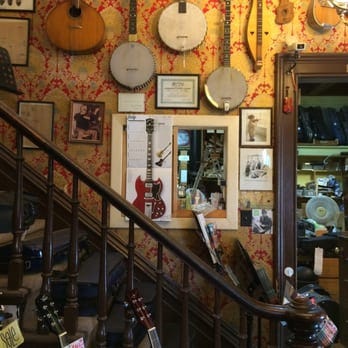
In intervals of dreams, I hear
A rustic violin
Crickets from the ground
Make a small immutable sound
By the fire
In our Camp of Souls
The Folklore Centre is not merely a music store. For over 50 years it has been a gathering place for “the community”, a kind of Camp of Souls… you know who you are. It was a library of stories told in strings and wood, a sanctuary where musicians and musical dreamers of all sort sought refuge, instruments, and a sense of relief for their restless and worried musical minds. In its modest home-like walls, there was a kind of quiet sacredness that, like some of the most storied and worn instruments high on the hallowed walls, wasn’t for sale. It came from care, from a love of a sort, and from Tom himself—his presence, his quiet devotion to the instruments of music and to the people who played them.
The Quietest Music Shop
At 16 I always had to muster up a certain amount of courage to go to the Folklore Centre. And at 60 not much had changed. Tom scared me when I was a kid because I felt he expected more of me - a lot more - when I came into his shop. Not just as a customer or musician, but as a person with a capacity for effort in all things so much greater than I had imagined just a moment before coming through the door.
Tom’s countenance, radiated a quiet strength and groundedness. He carried himself with the unassuming grace of a fine carpenter and the sharp insight of a philosopher. His face reflected years of labor, only slightly softened by a kind and knowing gaze that seemed to see both the beauty and folly of the world. His demeanor was warm but measured, exuding humility and a deep attentiveness to the person and task before him. He always spoke with deliberate thought, his voice calm and steady, as if the rhythms of the instruments he touched had shaped his every word. Tom embodied the values of his work: simplicity, rootedness, and a profound respect for the materials and working tools at hand.
What I was given, I could not buy
What I took away from the shop was not just guitars, strings, and harmonicas. It was something far more enduring. Tom’s Folklore Centre imparted a way of looking at music that was as practical as it was profound. He approached music with a tradesman’s sensibility: serious, methodical, and deeply respectful. Music was not merely a commercial endeavor, nor was it a frivolous pastime. It was a craft, an end in itself, deserving of discipline, care, and devotion.
Tom’s shop was a place where music was treated with the same dignity as any other meaningful work or trade. I’d call it vocational in the traditional sense. He viewed musicians not as lofty artists perched on a pedestal, but as craftsmen and women—people who honed their skills, labored with their hands, and sought excellence in their pursuit. This attitude shaped how I saw the real business of music and, in many ways, how I saw life. It taught me that music, like any worthy endeavor, demands patience, persistence, and respect to find a sense of progress and purpose. There is no shortcut. There is no easy way.
Rooted
I remember when graphic t-shirts became popular. I didn’t want an iron-on from the mall or the Keep on Truckin’ t-shirt from the comic book's back cover. It seems funny now. I just wanted a Halifax Folklore Centre t-shirt. Though I would not have been old enough to articulate what I was thinking, I saw it as part of my identity. Who I was.
Tom’s shop was an extension of my city incarnate—the place as I saw it when I first worked up the nerve on that thumpy old motorcycle and crossed the bridge. Halifax was like Avalon in a thick spring fog. It had everything I would ever need.
Tom tended the shop as I’ve seen farmers tend their fields, with patience and care. Each conversation, each repair of an old instrument, each shared quiet moment was a seed planted in the thin soil of the city’s musical ridges and furrows.
The Quiet Work of Stewardship
I’m thinking of the theme of stewardship—of people who see themselves as caretakers of something greater than themselves. Tom Dorward was such a steward. He was not a man seeking fame or fortune. He was a man who understood the quiet power of doing good work, of creating an instrument on which others could grow and thrive. The Folklore Centre was his farm, his small patch of ground in the world, and he tended it with diligence and love.
His passing is a reminder of how fragile such places are. They do not appear by accident, nor do they persist without care. They are capitalist in the best of Adam Smith’s sense when he said, “By pursuing his own interest he frequently promotes that of the society more effectually than when he really intends to promote it.” They’re never corporate. They’re not created by committee. They are always one person’s vision. But the dreams we have alone are just that. The dreams we have together are what the future is made from. They require someone like Tom and Marla coming together as one, as a family, a foundation stone. They require the kind of love that is willing to work without asking for applause.
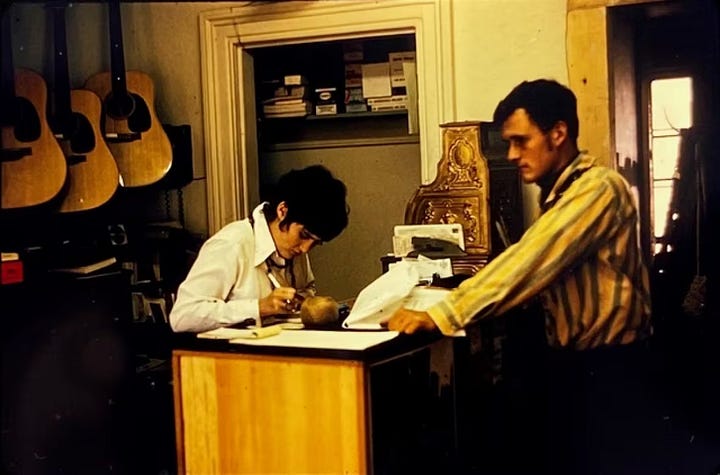
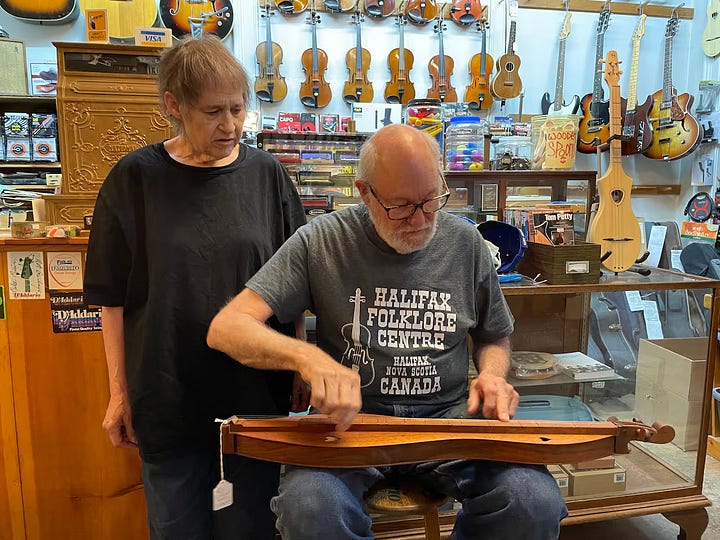
A Legacy of Song
To those of us mourning his passing, let us remember that we are part of his legacy. Every time we pick up a guitar, share a song, or create a space where others feel welcome, we carry his work forward. Let us be stewards, too, tending to the small, beautiful things that make our musical world grow a little.
The Shop as a Reflection of Its Keeper
The Halifax Folklore Centre was an extension of Tom himself. The scent of wood and varnish mingled with the twang of guitars being tuned, creating an atmosphere that was both reverent and alive. But what truly set the shop apart was the ethos it embodied—an ethos of care and craftsmanship. I believe with all my heart that will live on until the building comes down.
Carrying the Lesson Forward
As I reflect on Tom’s life and the legacy of the Halifax Folklore Centre, I am struck by how much of him remains in the lessons I carry with me. He showed me that the best work is not about fame or fortune, but about doing something well for its own sake. He taught me that music, like life, is a craft, and a fine instrument is a thing to be taken seriously, practiced with care, and pursued with respect. He reminded me that the tools we use, whether instruments or ideas, are only as good as the hands and minds that wield them.
Tom Dorward may be gone, but the values he lived and the lessons he taught endure. They are present in every musician who walked into his shop and left with more than they came for. They are in the songs that continue to be played, the instruments that continue to sing, and the lives that continue to be kept in tune and in time by his quiet wisdom. Tom’s life was a testament to the power of stewardship—a reminder that the most meaningful work is often the work done quietly, steadily, and with great love.
Thank you, Tom, for the gift of your life and your work. May we honor it with our own.
I’d love to read about the story of your first guitar from the Folklore Centre… or the last. And Halifax is a storied place. What folklore have you heard about the Folklore Centre growing up… truth or myth?


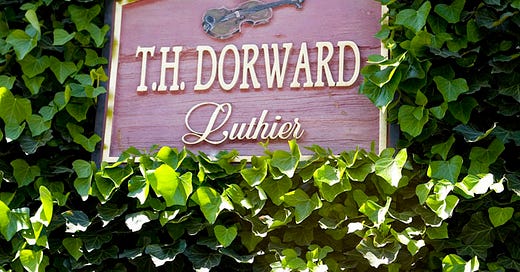



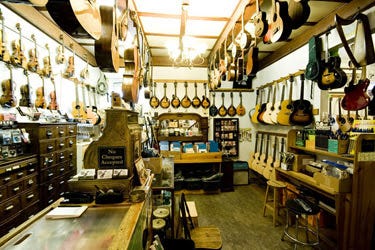

Lovely to hear your words about my grandpa and the store. I got to spend time in the HFC during the summers (when I wasn’t in some kid’s summer camp) and it was truly a wonder to sit there watching Tom work his magic.
Thanks John Wesley , I could identify with everyting you said sbout Tom. I loved dropping in saying hi. If he was open to chatv he would stop working and we would chat. I fekt like I was his friend by then sespecially as he allowed me right into his workshop. Thanks Tom . Jim